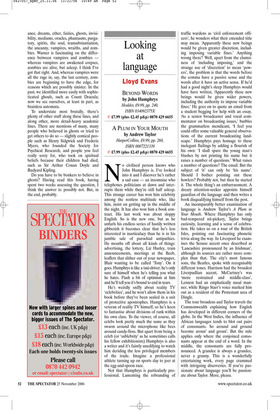Looking at language
Lloyd Evans
BEYOND WORDS by John Humphrys Hodder, £9.99, pp. 240, ISBN 034092375X ✆ £7.99 (plus £2.45 p&p) 0870 429 6655 A PLUM IN YOUR MOUTH by Andrew Taylor HarperCollins, £9.99, pp. 260, ISBN 0007221339 ✆ £7.99 (plus £2.45 p&p) 0870 429 6655 No civilised person knows who John Humphrys is. I’ve looked into it and I discover he’s rather a sad case — an insomniac who telephones politicians at dawn and interrupts them while they’re still half asleep. This strange career has won him celebrity among the restless multitude who, like him, insist on getting up in the middle of the night. It has also won him a book contract. His last work was about sloppy English. So is the new one, but as he unfurls his endless series of hastily written gibberish it becomes clear that he’s less interested in inarticulacy than he is in his jumble sale of parochial antipathies. He mouths off about all kinds of things: advertising, the lottery, Liz Hurley, train announcements, meetings at the Beeb, leaflets that slither out of your newspaper, Blair wanting to be called ‘Tony’. On it goes. Humphrys is like a taxi-driver; he’s only sure of himself when he’s telling you what he hates. Flash a bit of optimism at him and he’ll tell you it’s bound to end in tears.
He’s weirdly sniffy about reality TV ‘celebrities’, and he won’t allow them in his book before they’ve been sealed in a suit of protective apostrophes. Humphrys is a veteran of reality TV himself, so he’s keen to fantastise about divisions of rank within his own class. To the viewer, of course, all celebs look pretty much the same as they swarm around the microphone like bees around candy-floss. But apart from being a celeb (or ‘sublebrity’ as he sometimes calls his fellow exhibitionists) Humphrys is also a writer and it’s faintly unedifying to watch him deriding the less privileged members of the trade. Imagine a professional athlete turning up on sports day to jeer at the egg-and-spoon race.
Not that Humphrys is particularly professional. Lamenting the rebranding of traffic wardens as ‘civil enforcement officers’, he wonders what their extended title may mean. ‘Apparently these new beings would be given greater discretion, including imposing variable fines.’ Anything wrong there? Well, apart from the clumsiness of ‘including imposing,’ and the strange use of ‘discretion’ to mean ‘powers’, the problem is that the words before the comma have a passive sense and the words after it have an active sense. If he’d had a good night’s sleep Humphrys would have have written, ‘Apparently these new beings would be given wider powers, including the authority to impose variable fines.’ He goes on to quote an email from a student begging for help with an essay. ‘As a senior broadcaster and vocal commentator on broadcasting issues,’ burbles the grammarless mendicant, ‘I feel you could offer some valuable general observations of the current broadcasting landscape.’ Humphrys pays homage to these inelegant flailings by adding a flourish of his own: ‘I shall spare the young man’s blushes by not printing his name but it raises a number of questions.’ What raises a number of questions? The email. But the subject of ‘it’ can only be ‘his name’. Should I bother pointing out these howlers? Probably not, but then he started it. The whole thing’s an embarrassment. A dreary attention-seeker appoints himself guardian of the language and then writes a book disqualifying himself from the post.
An incomparably better examination of language is Andrew Taylor’s A Plum in Your Mouth. Where Humphrys has only bad-tempered nit-pickery, Taylor brings curiosity, learning and a sense of celebration. He takes us on a tour of the British Isles, pointing out fascinating phonetic trivia along the way. In Liverpool he examines the Scouse accent once described as ‘Lancashire pronounced by an Irishman’, although its sources are rather more complex than that. The city’s most famous sons, the Beatles, spoke with recognisably different tones. Harrison had the broadest Liverpudlian accent, McCartney’s was ‘more restrained and middle-class’, Lennon had an emphatically nasal manner, while Ringo Starr’s voice marked him out as a resident of the Protestant area of Dingle.
The tour broadens and Taylor travels the Commonwealth explaining how English has developed in different corners of the globe. In the West Indies, the influence of African languages tends to blot out pairs of consonants. So around and ground become aroun’ and groun’. But the rule applies only where the conjoined consonants appear at the end of a word. In the middle, the consonants are fully pronounced. A grandee is always a grandee, never a granny. This is a wonderfully entertaining work, every page crammed with intriguing discoveries. If you’re passionate about language you’ll be passionate about Taylor. More, please.


























































































 Previous page
Previous page